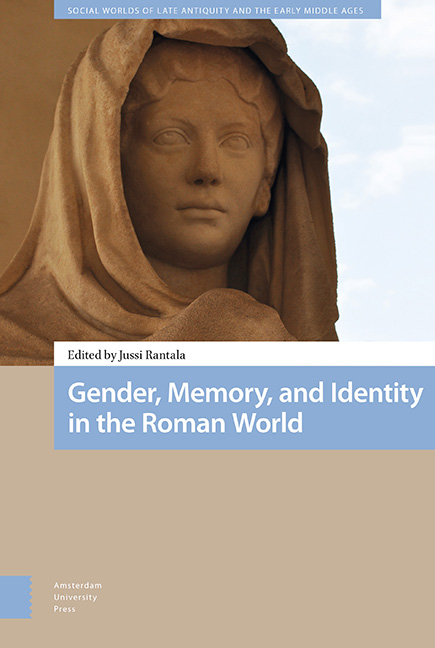Book contents
- Frontmatter
- Contents
- List of Illustrations
- Abbreviations
- Preface
- Tabula Gratulatoria
- Introduction
- 1 Public Agency of Women in the Later Roman World
- 2 Religious Agency and Civic Identity of Women in Ancient Ostia
- 3 The Invisible Women of Roman Agrarian Work and Economy
- 4 ‘Show them that You are Marcus’s Daughter’
- 5 Defining Manliness, Constructing Identities
- 6 ‘At the Age of Nineteen’ (RG 1)
- 7 Conflict and Community
- 8 Dress, Identity, Cultural Memory
- 9 The Goddess and the Town
- 10 Varius, multiplex, multiformis – Greek, Roman, Panhellenic
- 11 Mental Hospitals in Pre-Modern Society
- Index
11 - Mental Hospitals in Pre-Modern Society
Published online by Cambridge University Press: 20 November 2020
- Frontmatter
- Contents
- List of Illustrations
- Abbreviations
- Preface
- Tabula Gratulatoria
- Introduction
- 1 Public Agency of Women in the Later Roman World
- 2 Religious Agency and Civic Identity of Women in Ancient Ostia
- 3 The Invisible Women of Roman Agrarian Work and Economy
- 4 ‘Show them that You are Marcus’s Daughter’
- 5 Defining Manliness, Constructing Identities
- 6 ‘At the Age of Nineteen’ (RG 1)
- 7 Conflict and Community
- 8 Dress, Identity, Cultural Memory
- 9 The Goddess and the Town
- 10 Varius, multiplex, multiformis – Greek, Roman, Panhellenic
- 11 Mental Hospitals in Pre-Modern Society
- Index
Summary
Abstract
Historians of the pre-modern period mostly come up with early Islamic society as the ‘true’ inventor of mental asylums. To Michel Foucault, it was the rational response of the Age of Enlightenment that separated the mad completely from society. This paper argues that the famous quest for the prima causa has led historians to not seeing more fundamental issues: what was really going on in hospitals, or the profound impact of demonology and possession in different cultures alike. Moreover, I argue that the roots of the existential approach towards the mentally challenged at least go back to Late Antiquity: the miracles performed by Jesus, and subsequently by the saints, caused certain categories of disabilities to become more established and canonized than others.
Keywords: hospitals, mental health, demonic possession, seclusion
Introduction
Ever since the publication of Michel Foucault's seminal work Folie et déraison. Histoire de la folie à l’âge Classique (1961), the treatment of ‘madmen’ and the phenomenon of mental hospitals have been at the centre of many discussions on identity. To Foucault, the rational response of the Age of Enlightenment to the mad consisted in separating them completely from society by confining them, along with prostitutes, vagrants, blasphemers, and the like, in newly created institutions all over Europe. This process of ‘the Great Confinement’ strongly contributed to ‘the madmen’ being labeled as a separate category, whose outcast condition was also seen as one of moral error. In this contribution, I argue that the roots of such existential approach towards the mentally challenged at least go back to Late Antiquity. The miracles performed by Jesus, and subsequently by a plethora of saints, caused certain categories of disabilities to become more established and canonized than others. The category of the possessed and the ‘mentally deranged’, who were excluded from miraculous healing before, in Christianity received proper attention. Christianity also placed greater stress on the moral responsibility and the personal belief of those receiving healing.
Memory will play an important role in this chapter too, since the way charitable acts or institutions from the past were remembered to glorify a civilisation or to add to its reputation will be an important theme. From this aspect as well, it will appear that special care for the mad in specialized institutions goes back further than has been suggested by Foucault.
- Type
- Chapter
- Information
- Gender, Memory, and Identity in the Roman World , pp. 301 - 324Publisher: Amsterdam University PressPrint publication year: 2019



